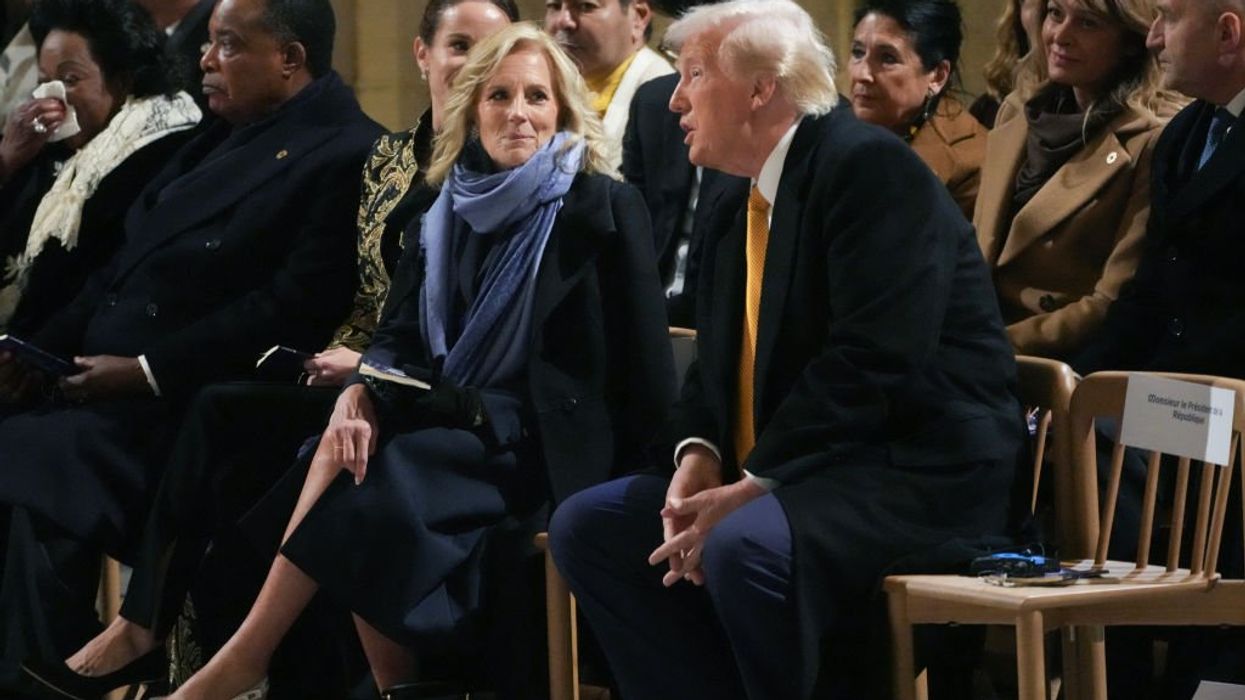© 2024 Blaze Media LLC. All rights reserved.
"It's become a bit challenging, for sure."
NEW YORK (AP) — As same-sex marriage becomes legal in New York — a world financial capital that often sets the corporate tone for businesses everywhere, and a city with a large gay and lesbian community — companies and individuals are wrestling with the changing complexities of their financial realities.
For straight couples, the choice has generally been to marry or not to marry, period. But conflicting state and federal marriage laws and questions about corporate benefits policies make financial planning decisions much less cut-and-dried for many gay couples.
Jason Ganns, an accountant from Albany, figures getting married to his same-sex partner will save him $350 to $450 a year in state income taxes — after a devil of a time reconciling those forms with his federal return, on which he won't be considered married.
New York City resident Andrew Troup and his partner have kept their health insurance policies separate because of tax complications and are now weighing whether merging them will make sense after marriage.
And if they've been waffling on marriage, some couples may now have to decide whether to take the plunge if their employers now restrict domestic partner benefits to the lawfully hitched.
"There's just a lot of rumors going around," said Erica Freudenstein, a 46-year-old freelance photographer from New York City who plans to wed her longtime partner, television video editor Cybele Policastro. Freudenstein has been covered under Policastro's health insurance.
"She has to pay taxes on it for my health insurance, and now for New York state I think she won't," she said. "So it's a benefit. It's all about the benefits."
New York is home to an estimated 42,600 same-sex couples, many already considered married in Canada and other places that allow gay marriage but are less business-heavy, including Iowa, Connecticut, New Hampshire, Vermont, Massachusetts and Washington, D.C.
The range of newly available benefits for New York's married gay couples will span from cradle to grave, affecting rights on everything from adoption to the settling of estates. But taxes and health care benefits are the dollar-and-cents issues in the forefront for many couples.
It is estimated that thousands of gay people in New York are covered under their partners' employer-provided health care plan. Married couples are not taxed on the value of an employer's contribution to cover their spouse, but it's been different for gay couples, even for New Yorkers who got legally married elsewhere.
Troup and his partner were married in Canada and have been recognized as such under New York law since 2009 — but they're not sure how their relationship status will change when New York on July 24 starts recognizing same-sex marriages performed in the state.
They work at different software companies and are weighing whether to merge their health insurance policies once they're married.
"We're going to have to sort of re-evaluate and decide whether it's more cost-effective to be under one plan or not," he said.
While marriage will afford gay couples some state tax benefits, federal taxes are still off the table because of the 15-year-old Defense of Marriage Act, under which federal law defines marriage as between a man and a woman and does not require states to recognize same-sex marriages performed outside its borders.
For Ganns and his husband-to-be, that means they can file jointly on their state returns but must file individually on the federal forms, which are typically used as the basis for state forms.
"Not only is that complicated, but our tax preparer will have to prepare a joint federal return to get certain numbers on that end up on that state joint return, and then throw federal return away because he can't file it anyway. ... It's going to cost most people more to get their taxes done," Ganns said.
A little more than a third of U.S. employers offer health coverage to their employees' same-sex partners, according to a report last week from the Society for Human Resource Management.
Some companies initially extended domestic partner benefits solely to same-sex couples to put them on equal footing, benefit-wise, with heterosexual employees who had the option of getting married.
With that inherent difference soon out the door, some couples in New York could face the choice of getting married or losing partner benefits if their companies restrict partner benefits to the legally married.
For instance, Elmira-based Corning Inc. extended benefits to same-sex domestic partners in 2002. But the specialty glass maker requires those couples residing in any state that permits same-sex marriages to be married to receive the benefit. IBM and defense contractor Raytheon Co. also will require New York employees to be married to receive benefits.
"The only thing that is changing is that now same-sex couples are going to have the opportunity to marry," said Louise Young, a Dallas-based senior software engineer for Raytheon who founded the company's Gay, Lesbian, Bisexual, Transgender and Allies Employee Resource Group. "And to be consistent in our benefit policies, they'll need to do so. But not in a punitive way at all. It's what we've been working for."
Companies including New York-based IBM, Raytheon, Beth Israel Deaconess Medical Center and Babson College took similar action in Massachusetts when it became the first state to allow same-sex couples to wed in 2004. The rationale behind the policy changes is to keep benefits consistent among all employees.
Retired IBM technical writer Suzanne McHugh, who gets eye and dental care for her partner, AnnaMae Schuler, under her IBM health plan, expects to be affected. McHugh, who was on an IBM task force that helped usher in domestic partner benefits for the company in 1996, is not troubled by it.
"Because of IBM's effort to be as fair as possible under the circumstances, I knew it would be an inevitability should it become legal in New York," she said. "So I'm not upset by it. I knew it was coming."
The two women, who live in Kerhonkson in the Hudson Valley, expect to get married in November, though not specifically for the health benefits. They also mentioned property tax benefits and said that after being together for 28 years, "it seems like the right thing to do."
Not all employers plan to force couples to marry to maintain benefits. General Electric Co. offers domestic benefits to same-sex couples and has no plans to change policies for its New York employees. Rochester-based Kodak, which extends benefits to same-sex and opposite-sex domestic partners, also has no change planned, a spokesman said.
Companies that are self-insured — typically those with more than 500 employees — don't have to follow state law, just federal law, which doesn't recognize gay marriage.
Those companies could, however, feel pressure to change their requirements, said Shawn Nowicki, director of health policy for the Northeast Business Group on Health, which represents employers who offer health benefits in New York, New Jersey, Connecticut and Massachusetts.
"The social movement will spur them to do some critical thinking about how to approach gay marriage," Nowicki said.
The specific effects of the New York law on business policy elsewhere is less clear.
Steven Wojcik, vice president of public policy at the National Business Group on Health, an association representing 300 large companies on health benefits and health care issues, said most large companies already provide domestic partner benefits, so the New York law might not change anything.
But M. Diane Burton, an associate professor of human resource studies at Cornell University, noted that what plays out in New York could affect business in other states.
"It is going to have a big impact because New York is a big state and it's going to hit a lot more employers," she said. "But many of those employers also have employees in other states. So what it does, it complicates things."
With marriages starting in three weeks, same-sex couples have a series of questions that will play out.
Freudenstein and Policastro were recently turned down for a refinance mortgage for a second home when they applied as individuals; one had a good job and poor credit, the other vice versa. But they might give it another try as a couple.
Troup and his partner, who were married in Canada in 2008, aren't sure if they need to get married twice.
"It's become a bit challenging, for sure," Troup said. "I think we're going to have to seek some legal counsel."
Want to leave a tip?
We answer to you. Help keep our content free of advertisers and big tech censorship by leaving a tip today.
Want to join the conversation?
Already a subscriber?
more stories
Sign up for the Blaze newsletter
By signing up, you agree to our Privacy Policy and Terms of Use, and agree to receive content that may sometimes include advertisements. You may opt out at any time.
© 2024 Blaze Media LLC. All rights reserved.
Get the stories that matter most delivered directly to your inbox.
By signing up, you agree to our Privacy Policy and Terms of Use, and agree to receive content that may sometimes include advertisements. You may opt out at any time.


